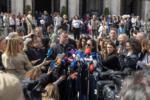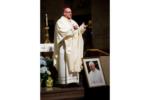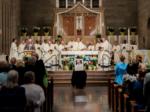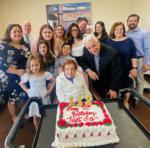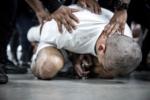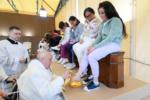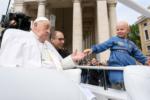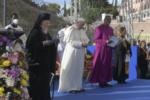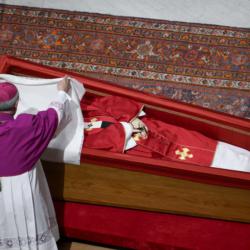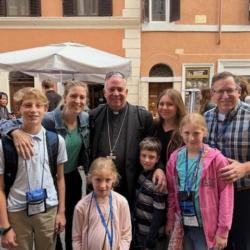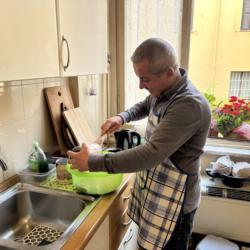ANALYSIS: Pope Francis leaves multifaceted legacy in style, message, communications
(OSV News) -- Days into Pope Francis' papacy in 2013, Massimo Faggioli remembers thinking that the new pope was "going to be the biggest story in the Catholic Church for this decade."
"This is something I want to follow, to study, to understand deeply -- every word of what Pope Francis says, every gesture," he said.
In the years since, Faggioli, a church historian and theology professor at Villanova University near Philadelphia, has written volumes on Pope Francis in both English and Italian, including "Pope Francis: Tradition in Transition" and "The Liminal Papacy of Pope Francis: Moving Toward Global Catholicity."
"His legacy is multifaceted," Faggioli told OSV News regarding Pope Francis who died April 21, Easter Monday, at age 88. "The most important contribution he gave to the papacy is to understand accompaniment and embrace a very different phase in the history of the globalization of Catholicism."
Faggioli attributed this, in part, to two of Pope Francis' papal firsts: being from Latin America, and being a Jesuit. Those vantages gave him "a pastoral approach to everything in the church, (and) enabled him to look at every issue from a point of view that was really global, really multi-perspective, multicultural," he said.
"And that was one of the sources of tension for many Catholics, especially in Europe, North America, who don't really understand that Catholicism has always been (more) -- but has become even more bigger -- than a European enterprise," he said.
Faggioli said Pope Francis globalized the papal office differently than his globetrotting predecessor St. John Paul II, whose 104 foreign trips were more than all the previous popes' combined.
With Pope Francis, "think about the diplomatic deal with China, but also the new approach to LGBTQ Catholics, marriage and the wars, which we're seeing no longer from a middle-class white, north-of-the-world perspective, but from the perspective of, for example, a single mother living in a poor country," he said. "Everything, I believe, goes back to that shift in the papacy that he's aware of a more global church, less European, less middle class, less focused on a narrower set of issues."
Pope Francis will be remembered as someone who "broke the mold of the papacy," said veteran Vatican journalist John Thavis, now retired after three decades working in Rome, including 16 years as Catholic News Service's Rome bureau chief. Observing the Francis papacy from his home in Minnesota has given him a vantage that more closely resembles the average Catholic than a Vatican insider, he said.
While the Francis papacy included situations of real intrigue and intricacy -- such as the multi-year Vatican finance trial, which included a panel of lay judges sentencing Italian Cardinal Giovanni Angelo Becciu, a former Vatican official, to prison for five-and-a-half years -- most Catholics absorbed Pope Francis through headlines and tweets, Thavis said.
"That lines up with Pope Francis' agenda, I think -- he's projected an image of the church as more open, less of a gatekeeper, more welcoming and more sympathetic to the conditions of poor people, migrants and others on what he calls 'the periphery,' and I think that plays very well," Thavis said. "Most people, most Catholics, are very sympathetic to that. So I see him as a pretty popular pope."
Kim Daniels, director of the Initiative on Catholic Social Thought and Public Life at Georgetown University in Washington, said Pope Francis "reminded Catholics in the world that we are called to be a poor church for the poor that goes out into the streets, a humble church that strives to live out our Gospel message of serving the least of these everyday around the globe."
That was evident, she said, from his time as archbishop of Buenos Aires, where as Cardinal Jorge Bergoglio he was known for simple living, such as taking the city bus and cooking his own meals, and personal attention to the poor.
That simplicity was evident immediately following his election: He took the name of St. Francis of Assisi, returned to his conclave hotel to pay his bill in person, and chose to live in the papal guesthouse instead of the papal apartments. During Holy Thursday that year, he washed the feet of young people in a detention center.
Released in November 2013, Pope Francis' first apostolic exhortation, "Evangelii Gaudium" ("The Joy of the Gospel"), read like a blueprint of his vision for the papacy, Daniels said.
"The poor and care for the poor is central to 'Evangelii Gaudium,'" she said. "He talks about going forth, not staying within the church or having a false sense of security, but going out into the streets. He says Jesus is not tired of saying to us, 'Give them something to eat.'"
Daniels said Pope Francis illustrated that throughout his papacy, pointing to several iconic moments: his visit to the Italian island of Lampedusa July 8, 2013, to compel Christians to help migrants risking their lives crossing the Mediterranean, and his solitary prayer and special "urbi et orbi" ("to the city of Rome and to the world") blessing before a rain-soaked St. Peter's Basilica in March 2020 amid the COVID-19 pandemic, which hit Italy early and hard.
Daniels recalled "This elderly man, suffering aches and pains and unmistakenly filled with the joy of the Gospel in that steady rain."
"He comforts people and ... he asks us to be not afraid, and most of all, he calls us to solidarity in this frightened world," she said. "That call of solidarity, to me, is just central to his papacy."
Pope Francis' ultimate goal was evangelization, Thavis said, and as pope he pivoted away from the church's emphasis on "the rules of belonging to our church" to emphasize common ground and preaching a simple Gospel message. As the numbers of people with no church affiliation increase, especially among young people, he said, "I think one of the pope's pastoral strategies is to not lose these people and to build bridges to them. Often, he's built those bridges by very simple statements either of faith or of outreach."
Thavis said he expects Pope Francis to especially be remembered for setting the church "on a new path of evangelization" that "reaches out to all people, welcomes them instead of enforcing the rules of membership."
"He's made it a point in his public action, in his teachings to reach out in particular to migrants in a globalized economy, and to the poor," he said. "He'll be remembered as the pope who did things differently … starting from day one, when he moved out the papal palace, for example, and he started doing these impromptu interviews uncontrolled by the normal Vatican gatekeepers. He's named cardinals for small and very far-flung dioceses. He really has upset this kind of general hierarchical system that was at play in the Catholic Church, in terms of 'if you're an archbishop of a big city archdiocese, then you get a cardinal's hat.' Those expectations are now gone."
If a bishop's three main tasks are teaching, governing and sanctifying, Pope Francis would earn high marks for teaching on the environment -- with his encyclical on human ecology "Laudato Si'" in 2015 and its 2023 follow-up, "Laudate Deum" -- as well as on the family, outlined in his 2016 apostolic exhortation "Amoris Laetitia," which followed two synods of bishops on the family.
The pope's governing, however, might get lower marks, Thavis said. "He has not used the Vatican's institutions in the way that other popes have, and not tried to use them to his own benefit," he said. "That's left many inside the Vatican in Rome with a feeling that he's missed an opportunity here."
As for sanctifying, "evangelization is where he's put his greatest efforts," Thavis said, noting the themes of "Evangelii Gaudium." He described that text as "how the church evangelizes with the joy of living the Gospel in daily life, by example, and not by rules and exclusions."
While any future pope will have to teach, govern and sanctify, Thavis said, Pope Francis may have added a fourth dimension: listening.
"Traditionally that has not been a role of pope or bishop, but he has made it one of the cardinal tasks: He's gone out of his way to listen to people, invite people from all walks of life to meet with him, talk with him, eat with him, dine with him," he said.
Listening has been at the core of the Synod on Synodality, which many observers consider Pope Francis' magnum opus. The pope's emphasis on synodality, however, revealed "tensions" in his papacy, Faggioli said.
"On the one side, Pope Francis launched the project for a synodal church, synodality, meaning a less clerical church, less monarchical, more participation of laypeople, all of that," Faggioli said. "At the same time, if we look at the way Pope Francis has governed the church and the Vatican and the curia, it has become a church more focused on the person of the pope."
The question now is how, or if, the next pope will reconcile "those two opposite pushes," he said. "This is part of the long story of the Vatican, how it's been governed. It's a very complex machine, and Pope Francis chose a particular style of doing that."
- - - Maria Wiering is senior writer for OSV News.


